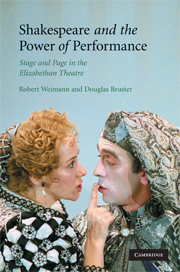Book contents
- Frontmatter
- Contents
- Acknowledgments
- Introduction
- Chapter 1 “Moralize two meanings” in one play: contrariety on the Tudor stage
- Chapter 2 Performance, game, and representation in Richard III
- Chapter 3 Mingling vice and “worthiness” in King John
- Chapter 4 Clowning: agencies between voice and pen
- Chapter 5 Clowning at the frontiers of representation
- Chapter 6 Cross-dressing and performance in disguise
- Chapter 7 Personation and playing: “secretly open” role-playing
- Chapter 8 Character/actor: the deep matrix
- Chapter 9 Character: depth, dialogue, page
- Chapter 10 King Lear: representations on stage and page
- Notes
- Index
- References
Chapter 1 - “Moralize two meanings” in one play: contrariety on the Tudor stage
Published online by Cambridge University Press: 22 September 2009
- Frontmatter
- Contents
- Acknowledgments
- Introduction
- Chapter 1 “Moralize two meanings” in one play: contrariety on the Tudor stage
- Chapter 2 Performance, game, and representation in Richard III
- Chapter 3 Mingling vice and “worthiness” in King John
- Chapter 4 Clowning: agencies between voice and pen
- Chapter 5 Clowning at the frontiers of representation
- Chapter 6 Cross-dressing and performance in disguise
- Chapter 7 Personation and playing: “secretly open” role-playing
- Chapter 8 Character/actor: the deep matrix
- Chapter 9 Character: depth, dialogue, page
- Chapter 10 King Lear: representations on stage and page
- Notes
- Index
- References
Summary
The “memory” that held “a seat / In this distracted globe” (Hamlet, 1.5.96–7) clearly included the recollection of the Morality stage. For one thing, Shakespeare's plays remembered the morality tradition through the latter's most theatrical figuration: the “old Vice” (Twelfth Night, 4.2.124). As highly performative equivocator, the Vice drew on two divergent modes of authorizing the uses of dramatic language and theatrical space. Central to this divergence in discursive practice was a formal incongruity between the serious and the comic which, though deeply embedded in the earlier history of medieval drama, continued to provide a semantic underside to the morality context. Combining sinfulness and sport, the Vice – a strange gallimaufry of types and roles – appealed to a divided authority in signification. Through the performative thrust of his own lop-sided inclination, this farcical agent pointedly upset symmetries in the allegorical order of things. Disturbing the homiletic bifurcations between good and evil, the Vice championed all sorts of confusions between serious sinfulness and comic theatricality.
In English Renaissance drama the Vice is perhaps best remembered in the traces he left, via Richard Tarlton and Will Kemp, in the Shakespearean clown. More broadly, his legacy helped Renaissance dramatists straddle the divide between the comic and the tragic, and gave them a powerful model for, among other “playwright” figures in dramatic texts, the darkly humorous plotters of revenge tragedy.
- Type
- Chapter
- Information
- Shakespeare and the Power of PerformanceStage and Page in the Elizabethan Theatre, pp. 26 - 41Publisher: Cambridge University PressPrint publication year: 2008



